SWEDISH SOUTH ASIAN STUDIES NETWORK
Human Ecology Division, Lund University:
Postal address: Sölvegatan 12,
223 62 Lund, Sweden
Visiting address: Geocentrum byggnad I (Sölvegatan 10)
Web page: http://www.humecol.lu.se/
Contact persons: • Professor Alf
Hornborg,
phone +46 (0)46 - 222 31 13
• Senior Lecturer Pernille
Gooch, Phone: +46 (0)46-222 30 24
The
Human Ecology Division was established in 1994. Human Ecology is the
study of human-environmental relations in different cultural contexts.
A fundamental question is how cultural perceptions of nature influence
and are influenced by social relations and modes of livelihood. The courses
in Human Ecology aim at helping the student achieve a multi-faceted
and theoretically profound understanding of the interaction between humans
and their natural environment in different periods of history and different
parts of the world. The Division used to be administratively part of Lund University’s
Department of European Ethnology, but from November 2008, it is a division within the Department of Social and Economic Geography instead.
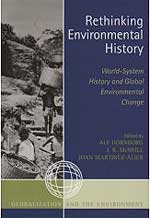 A
major conference titled ”World System History
and Global Environmental Change” was arranged by the Human
Ecology Division 19–22 September 2003. The conference, organised
by Prof. Alf Hornborg, brought together key
International scholars from the social, historical, geographical and
environmental sciences, in an effort to broaden our view of the ecological
dimension of global, economic processes in a long-term, historical perspective.
A
major conference titled ”World System History
and Global Environmental Change” was arranged by the Human
Ecology Division 19–22 September 2003. The conference, organised
by Prof. Alf Hornborg, brought together key
International scholars from the social, historical, geographical and
environmental sciences, in an effort to broaden our view of the ecological
dimension of global, economic processes in a long-term, historical perspective.
Afterwards, selected papers from the conference have been published in
a volume titled ”Rethinking Environmental
History. World System History and Global Environmental Change”.
The book, edited by Prof. Alf Hornborg together with Prof. Joan
Martinez-Alier (one of the World’s leading specialists
within the field of Ecological Economy, and involved in several India
related research projects) from
University of Barcelona, Spain, and Prof. John
R. McNeil, Georgetown
University, Washington D.C., USA, was published in January 2007 by AltaMira
Press in USA.
It gives an overview of the ecological dimension of economic
processes, presenting a framework for understanding the relations between
ecosystems and world systems. It also contains reflections by renowned
Yale sociologist Immanuel Wallerstein, originator
of the world-system concept, in which he talks about the various implications
of global environmental change. Readers are challenged to integrate studies
of the Earth system with studies of the World system, and to re-conceptualize
human-environmental relations and the challenges of global sustainability.
Wallerstein himself closes the volume with his reflections on the intellectual,
moral, and political implications of global environmental change.
More information.
On 15–16 February 2006, the Human Ecology Division
arranged an International two-day workshop on the topic of ”Trade
and Environmental Justice”. The objective was to discuss
and compare different non-monetary measures of commodity flows, such
as ecological footprints, eMergy, material flow analysis, and exchange
of embodied labor, in relation to overarching issues of political ecology,
ecologically ”unequal” exchange, ecological distribution
conflicts, and environmental load displacement.
Scandinavian as well as international researchers discussed different
aspects of Trade and Environmental justice. Among the invited participants
were Joan Martinez Alier, Roldan Muradian and Simron Jit Singh. The workshop
was organised in collaboration with LUCSUS (Lund
University Centre for Sustainability Studies) and AGESI,
the Arena for Global Equity and Sustainability. More
information about the workshop.
An international conference on ”Ecology and Power. Critical perspectives on the discourse on sustainability and resilience” has been held at Lund University 17–19 September 2008. It was hosted by the Human Ecology Division, and funded by the Bank of Sweden Tercentenary Foundation. In a session focusing on ”Critical interventions in political ecology”, the keynote lectures were given by Nancy Peluso from University of California, and Michael Sheridan from Middlebury College, Vermont, USA. Dr. Pernille Gooch talked about ”Scientific vs. Local Knowledge: Power and Sustainability in the Central Indian Himalayas”, and Dr. Beppe G. Karlsson, Dept. of Cultural Anthropology, Uppsala University, talked about ”Nuclear Lives: Uranium Mining in India”. See the full programme (as a pdf-file)
In
November 2007, the Swedish Research Council for Environment, Agricultural Sciences and Spatial Planning (Formas) decided to fund an interdisciplinary project titled ”Power, Land and Materiality: Global Studies in Historical-Political Ecology as a Framework for Assessing Policies for ‘Sustainable Development’", coordinated by Prof. Alf Hornborg. The project is carried out in collaboration between 10 researchers from the departments of Human Ecology in Lund and Göteborg, the departments of Human Geography in Lund and Stockholm, the Dept. of Agrarian History at the Swedish University of Agricultural Sciences (SLU) in Uppsala, and the Dept. of Economic History in Stockholm. Sub-studies will be made in several countries. In South Asia, Dr. Mats Mogren from the Dept. of Archaeology, Lund University, will do a study in Sri Lanka, on ”Plantation Colonialism and the Change of Landscape in Sri Lanka. A historical-archaeological case study”. More information about the Formas grant.
Project abstract: The project will consolidate a coherent, trans-disciplinary theoretical and methodological framework for studying processes of long-term environmental change. Building on previous research as well as six case studies in South America, Africa and Asia, it will bring together a network of Swedish expertise on the subject as the core of a national "think-tank" engaged in empirical studies of long-term sustainability from different parts of the world, and in refining a common theoretical framework. The consolidation and elaboration of this theoretical framework – tentatively called "global historical-political ecology" – is thus an important aim of the project, but can only be conducted through continuous interaction and engagement with the empirical case studies. The central analytical perspectives to be developed emphasize that landscapes must be understood as the cumulative material imprints of historically successive patterns of land use reflecting shifting regional and global relations of economic and political power.
Research directly connected to South Asia:
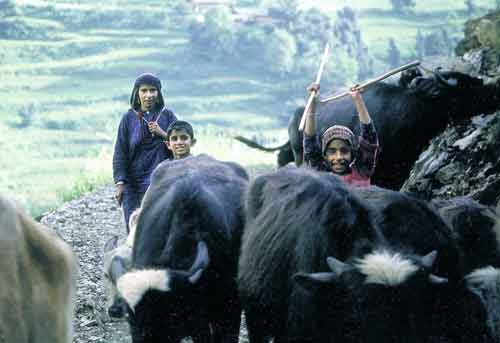
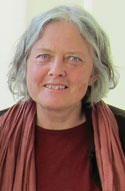 • Pernille
Gooch (photo to the left) defended her
doctoral dissertation ”At the
Tail of the Buffalo: Van Gujjar Pastoralists between the Forest
and World Arena”
at the Department of Sociology, Lund University,
on 4 November 1998. Faculty opponent was Professor Tim Ingold, Dept.
of Social Anthropology, Manchester University, Manchester, England. More
information with abstract.
Since 1999, Pernille Gooch is working as a Senior lecturer in the Human Ecology Division.
• Pernille
Gooch (photo to the left) defended her
doctoral dissertation ”At the
Tail of the Buffalo: Van Gujjar Pastoralists between the Forest
and World Arena”
at the Department of Sociology, Lund University,
on 4 November 1998. Faculty opponent was Professor Tim Ingold, Dept.
of Social Anthropology, Manchester University, Manchester, England. More
information with abstract.
Since 1999, Pernille Gooch is working as a Senior lecturer in the Human Ecology Division.
From 2009, Dr. Gooch is also one of the participating researchers in the new Lund University Centre of Excellence for Integration of Social and Natural Dimensions of Sustainability (LUCID), a Linnaeus programme sponsored by The Swedish Research Council for the period 2008–2018. LUCID is coordinated the Centre for Sustainability Studies at Lund University (LUCSUS).
She is also a teacher at the Masters programme in Asian Studies,
organised by Lund University’s Centre for
East and South-East Asian Studies (ACE).
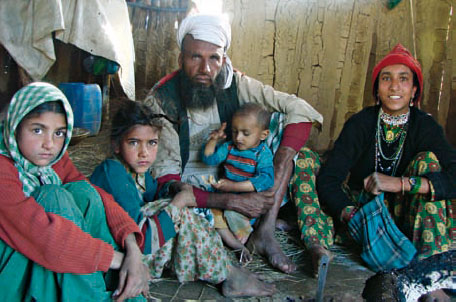 Dr. Gooch has continued with post-doc research projects on the same topic as her PhD thesis, about the Van Gujjar pastoralists in the Western Himalayas. Van Gujjar are indigenous
Muslims who live nomadically. In winter, they stay
in the Shivalik forest between the rivers Ganga
and Yamuna in the states of Uttaranchal and Uttar
Pradesh. In summer, they migrate to higher
regions in Himachal Pradesh and Uttaranchal. “Van” means “forest” in Hindi and signifies the
close relationship between the Van Gujjar and the
forest. They raise buffaloes that feed on the forest
flora and they exchange their milk for agricultural
produce or, more commonly these days, sell it.
Dr. Gooch has continued with post-doc research projects on the same topic as her PhD thesis, about the Van Gujjar pastoralists in the Western Himalayas. Van Gujjar are indigenous
Muslims who live nomadically. In winter, they stay
in the Shivalik forest between the rivers Ganga
and Yamuna in the states of Uttaranchal and Uttar
Pradesh. In summer, they migrate to higher
regions in Himachal Pradesh and Uttaranchal. “Van” means “forest” in Hindi and signifies the
close relationship between the Van Gujjar and the
forest. They raise buffaloes that feed on the forest
flora and they exchange their milk for agricultural
produce or, more commonly these days, sell it.
For many years, Pernille Gooch has been in close contact with the Society for Promotion of Himalayan Indigenous Activities (SOPHIA), an Indian NGO based in Dehra Dun, working with nomadic Van Gujjars. SOPHIA was formed in 1996 by Mr. Praveen Kaushal, commonly known as Manto, and is actively working to safeguard rights and ensure sustainability of Van Gujjar livelihood.
During the time Pernille Gooch wrote her dissertation, Manto worked as her research assistant. Later, Dr. Gooch has regularly brought undergraduate C- and D-level students from the Human Ecology department to Dehra Dun for field work. The students have been accommodated and given assistance by SOPHIA.
In October 2009, Lund University magazien LUM published an article about Pernille Gooch and her research among the Van Gujjars in India. The article is written by the journalist Ingela Björck and is entitled ”Buffelns bästa vän”. Read the article (in Swedish).
In December 2003 she got Swedish Research Links grant for a one-year
project on ”Developing project on analysis
of contemporary issues related to carrying capacity of pastoralism in
higher Himalaya” . See
SASNET’s list of South Asia related projects given Swedish Research
Links grants in 2003.
In October 2006 Dr. Pernille Gooch was again given a Swedish Research
Links grant, this time for three years (2007-09) for the project now
titled ”Participatory Assessment of Sustainable
Scenarios for Himalayan Pastoralism”. See
SASNET’s list of South Asia related projects given Swedish Research
Links grants in 2006.
The project is carried out in collaboration with Dr. Nehal
A. Farooquee and Dr. Devendra
Kumar Agrawal, both at Govind
Ballabh Pant Institute of Himalayan Environment and Development in
Almora, Uttaranchal state, India. This is an autonomous research institute
under the Indian Ministry
of Environment and Forestry. Another researcher at the same institute,
Dr. R.K. Maikhuri, senior scientist with a speciality in botany, is also
involved in the project.
Project abstract: Pastoral grazing make substantial contributions to the economy of developing countries, both in terms of supporting their households and in supplying protein as well as other animal products. Realizing the importance this proposal has been developed to view them in the light of sustainability. For the study two pastoral communities have been selected, the Bhotias and the Van Gujjars of Uttaranchal. Both transact right from the foothills to alpine meadows thus covering entire altitudinal eco-zones of the Himalayas. The linkages with numerous other stakeholders of bio-resources in these altitudinal zones will be covered in the project. Under the joint research planning grant preliminary surveys of the study area were made and a workshop with the participation of the stakeholders from both the pastoral groups, researchers and NGOs was organized. The present proposal seeks to understand and quantify the potential of pastoralism through an empirical application of inter- and transdisciplinary approaches. The project aims to: a) improve scientific understanding of participatory and transdisciplinary approaches to identify the issues related to sustainability of pastoralism b) integrate results within a broader theoretical understanding of the interrelations between society and nature, in order to bridge social and natural sciences c) provide reliable socioeconomic and environmental information on the pastoral systems in the region that has so far remained under-researched.
On 22 October 2007, the Swedish Research Council decided to give additional SEK 1.4 million as a three-year grant (2008-10) to Dr. Gooch, for the same project. Read an abstract of the project (in Swedish only).
On 4 May 2011, Pernille Gooch participated in the seminar on ”Forest Rights in India” that was jointly organised by SASNET, Lund University Centre for
Sustainability Studies (LUCSUS),
and The Swallows India Bangladesh. More information. ![]()
PhD Candidate Nabikanta Jha is also working on this projekt. More information below. ![]()
Dr. Gooch has also been involved as a research partner in a project titled ”Lives
at Risk; Discrimination of female children in modern India”, coordinated by Associate Professor Neelambar Hatti, Dept. of Economic History, Lund University. The project was running during the period 2002-05, and was funded by the Swedish Research Council (more information on the project, in Swedish only). The project looked into the casues and consequences of discrimination
of female children in modern India, by looking at five states –
Haryana, Punjab, Uttaranchal, Tamilnadu and Karnataka. The first three
states having the worst figues for the 0-6 age group, whereas Tamilnadu
is particularly interesting because of the predominance of infanticide
in four districts. Pernille Gooch was in charge of the research in the Himalayan state of Uttaranchal.
A paper titled ”Uncertainty Vulnerable daughters” was jointly presented
by Mattias Larsen, Pernille Gooch and Neelambar Hatti, at the CEPED-CICRED-INED
Seminar on ”Female Deficit in Asia: Trends and Perspectives”, held in
Singapore, 5–7 December 2005. Read
the draft paper.
In February 2006 Dr. Gooch received
a SASNET
planning grant for a project called ”Mangrove
conservation as a sustainable life insurance for coastal Tamil Nadu
communities.”
Project abstract: Mangrove conservation as a sustainable
life insurance for coastal Tamil Nadu communities Abstract Pichavaram
is a small village by the coast of Tamil Nadu, India where the mangrove
forest protected people from the worst effects of the Christmas 2004
tsunami. Mangrove forests and wetlands not only serve as a bio-shield
against cyclones and hurricanes, they are also extremely productive and
biologically rich ecosystems of great value to humans. In recent years
conservation and restoration projects have been initiated involving local
communities to save mangroves and at the same time reduce poverty. The
aim of the proposed project is to plan for a future Ph.D. study in human
ecology of the post-tsunami situation in Tamil Nadu. This will evaluate
whether the tsunami has changed the way mangrove value is perceived and
if the concept of development is in any way altered.
Dr. Gooch coordinates the project, but the main
research work is conducted by Eva
Wramner and Jeanette
Schlaucher.
Both of them are former Masters students with a background
in the natural sciences with studies in Biology, Ecology and Environmental
science, as well as in Human Ecology. Jeanette Schlaucher wrote
her Masters thesis on Dam projects in India
and Bangladesh – large-scale dams versus small-scale dams (drip
irrigation), and another paper on Women in Development projects in Bangladesh,
called ”The dream of the extremely poor woman
in Bangladesh”. Go
for the full paper (as a pdf-file). Eva Wramner wrote her Masters
thesis in the Environment, Culture and Development programme, called
'Fighting Cocacolanisation in Plachimada' dealing with the conflicts
that emerged from Coca-Cola's exploitation of groundwater in a small
indian village in Kerala. Poor was put against rich but also poor against
poor. Moreover local self-government clashed with state government over
the issue. Read
the full paper (as a pdf-file).
 The
mangrove project is carried out in cooperation with Professor V.
B. Athreya and the M S Swaminathan Research
Foundation in Tamil Nadu. Field work was done in the Fall 2006,
with assistance from the Coastal
Poor Development Network, COPDANET, an organisation wotking with rural
development and reafforestation in Tamil Nadu. The area of study included
Pulicat Lake, nort of Chennai, and also the coast south of Chennai.
The
mangrove project is carried out in cooperation with Professor V.
B. Athreya and the M S Swaminathan Research
Foundation in Tamil Nadu. Field work was done in the Fall 2006,
with assistance from the Coastal
Poor Development Network, COPDANET, an organisation wotking with rural
development and reafforestation in Tamil Nadu. The area of study included
Pulicat Lake, nort of Chennai, and also the coast south of Chennai.
In August 2009, Dr. Gooch was awarded another SASNET planning grant
for a research project titled ”Water, Climate Change and Rural Livelihoods: Assessing Socioeconomic Vulnerability and Potential Adaptive Strategies in Sikkim, India”. More information about the 2009 SASNET planning grants.
A few months later, in December 2009, she was also awarded a planning grant for the same project from the Swedish Research Links programme (Asian–Swedish research partnership programme). See the full list of South Asia related projects given Swedish Research Links gants 2009.
The project is carried out in collaboration with the senior researchers K Sreelakshmi, Anamika Barua, and Nitish Jha, at the Water Resources Policy and Management Division, The Energy and Resources Institute (TERI) in New Delhi, India.
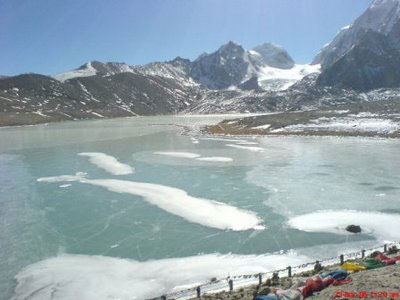 Project abstract: We want to assess the degree of socioeconomic vulnerability of rural communities to climate change in Sikkim, an Indian state in the eastern Himalayas. On this basis, a proposal will be developed to study the links between water, climate change, and rural livelihoods using a multidisciplinary methodological framework.
Project abstract: We want to assess the degree of socioeconomic vulnerability of rural communities to climate change in Sikkim, an Indian state in the eastern Himalayas. On this basis, a proposal will be developed to study the links between water, climate change, and rural livelihoods using a multidisciplinary methodological framework.
Studies linking water use, livelihood security and adaptive measures of indigenous communities in mountainous areas of the world reveal that high altitude ecosystems are very sensitive to global warming. However, the approach of most studies has been either purely technical or social or economic. In contrast, the proposed study will adopt a multidisciplinary approach that will also go beyond the conventional assumption that water is used only for either consumption purposes or irrigation by considering multiple productive uses of water.
The team for the planning grant will include anthropologists and economists from two institutions in Sweden and India that are recognized for their work on climate change issues. The grant will facilitate a better exchange of ideas between team members through face-to-face meetings, enable preliminary trips to survey the field, and allow the organization of a workshop held to communicate the objectives of the future, collaborative project to stakeholders, including state-level decision makers and community representatives.
In early 2010, Dr. Anamika Barua moved from TERI to the Indian Institute of Technology (IIT) Guwahati, and the Indo-Swedish collaborative research project will henceforth be carried out with IIT Guwahati as base. She is the Indian co-coordinator for the project.
In October 2010, Dr. Pernille Gooch was awarded SEK 1.5 m as a three-years grant (2011-13) from Sida/SAREC’s Developing Country Research Council for this project, now entitled as ”Climate Change, Water & Rural Livelihoods: Assessing Socioeconomic Vulnerability & Potential Adaptive Strategies in Eastern Himalayan Region of India”. More information.
The project will be carried out with the partners at IIT Guwahati; Sikkim University; Department of Science and Technology, Government of Sikkim; and TERI. The initial SASNET funding was used for a preliminary pilot field study in collaboration with University of Sikkim. ![]()
 • Simron
Jit Singh (photo to the left) originally coming
from Indian Punjab has been connected to the division as a graduate
student, but is also connected to the University of Wien, Austria,
working as a researcher and lecturer at Abteilung
Soziale Ökologie, Institut für Interdisziplinäre
Forschung und Fortbildung der Universität Wien (IFF). Personal
web page. He defended his dissertation on ”In
the Sea of Influence: A World System Perspective of the Nicobar
Islands”
at Lund University on 6 December 2003. The faculty opponent was Professor
Joan Martinez-Alier, University of Barcelona, Spain. More information.
• Simron
Jit Singh (photo to the left) originally coming
from Indian Punjab has been connected to the division as a graduate
student, but is also connected to the University of Wien, Austria,
working as a researcher and lecturer at Abteilung
Soziale Ökologie, Institut für Interdisziplinäre
Forschung und Fortbildung der Universität Wien (IFF). Personal
web page. He defended his dissertation on ”In
the Sea of Influence: A World System Perspective of the Nicobar
Islands”
at Lund University on 6 December 2003. The faculty opponent was Professor
Joan Martinez-Alier, University of Barcelona, Spain. More information.
Abstract: From a “world system” perspective,
this monograph describes the processes by which the Nicobar Islands became
integrated into the global economy. Situated some 1,200 km off the east
coast of India in the Bay of Bengal, the islands are home to an indigenous
population of approximately 40,000 inhabitants who draw their sustenance
from horticulture, pig rearing, fishing and, more recently, copra production.
The location of the Nicobar Islands on an ancient trade route to South
East Asia has had inevitable consequences for both the inhabitants and
the islands’ ecology; the pace of change increasing with the European
colonisation of Asia. The islands are no longer a source of food and shelter
to passing vessels as they used to be in former times, but are positioned,
despite present protectionist measures, on the disadvantaged side of an
exploitative relationship through an unequal exchange of resources within
the modern world system. In drawing linkages between the world system
perspective and environmental change, this monograph emphasises a shift
from monetary indicators to biophysical indicators. Based on archival
material and prolonged fieldwork, the monograph is a first detailed account
of the colonial and economic history of the Nicobar Islands, and hence
of interest not only to the scientific community, but to the general reader
as well. (The thesis has been published as a monograph in the Lund
Studies in Human Ecology Publication series, No 6, by Lund University
Press. ISBN: 91-628-5854-8).
| Researchers from the Human Ecology Division during the visit by Prince Rasheed Yusuf from the Nicobar Islands in April 2003. Prince Rasheed, in the middle, is surrounded by Dr. Pernille Gooch and Dr. Simron Jit Singh. Photo: Lars Eklund |
The
Prince of the Nicobar Islands, Rasheed Yusuf (photo
below), visited the Human Ecology Division between the 21 and the
27 of April 2003.
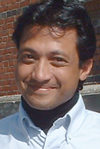 On 22 April 2003, Rasheed Yusuf, who is a representative
of the Tribal Council Nancowry, held a seminar titled ”Fighting
economic exploitation in the Central Nicobars”, dealing with
the period of economic exploitation that began after the death of his
grandmother, Rani Lachmi, who was a formidable leader. His talk also
included facts about how the Nicobarese have been exploited by outsiders,
and their fight against this. The following day, on 23 April 2003,
Simron J. Singh, talked about ”The
political situation on the Nicobar Islands after Indian Independence”.
On 22 April 2003, Rasheed Yusuf, who is a representative
of the Tribal Council Nancowry, held a seminar titled ”Fighting
economic exploitation in the Central Nicobars”, dealing with
the period of economic exploitation that began after the death of his
grandmother, Rani Lachmi, who was a formidable leader. His talk also
included facts about how the Nicobarese have been exploited by outsiders,
and their fight against this. The following day, on 23 April 2003,
Simron J. Singh, talked about ”The
political situation on the Nicobar Islands after Indian Independence”.
The visit to Lund by Prince Rasheed Yusuf was described in an article by
Hans-Jørgen
Wallin Weihe published in SYDASIEN 3/2003. The article was titled ”Nikobarerna – Koleran
stoppade alla försök att kolonisera öarna i Indiska Oceanen”.
Read the article.
In April 2005 Simron Jit Singh was invited as a keynote
speaker to the post-tsunami symposium organised by SASNET on behalf
of Lund University. Simron Jit came straight from the Nicobar
Islands where he had actively worked with relief assistance ever since
the Tsunami struck the region on 26 December 2004. More
information on Simron Jit Singh’s speech at the Lund conference.
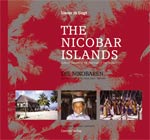 Simron
Jit Singh is also involved in the preservation of Nicobarese culture,
represented in a unique collection at Vienna's Museum of Ethnology, where
relics, brought to Vienna over 140 years ago by Austrian explorers, belong
to a world now lost. Since the Tsunami struck the Nicobars on 26 December
2004, the museum has become something of a Noah's Ark of Nicobarese culture,
and recently Singh organized a trip for the Nicobarese tribal leaders
to Vienna. Read an article on this, called ”A
Tsunami-Devastated Tribe Finds a Cultural Noah's Ark in Vienna”
by Gerald Traufetter, published in Der Spiegel Online,
12 October 2005.
Simron
Jit Singh is also involved in the preservation of Nicobarese culture,
represented in a unique collection at Vienna's Museum of Ethnology, where
relics, brought to Vienna over 140 years ago by Austrian explorers, belong
to a world now lost. Since the Tsunami struck the Nicobars on 26 December
2004, the museum has become something of a Noah's Ark of Nicobarese culture,
and recently Singh organized a trip for the Nicobarese tribal leaders
to Vienna. Read an article on this, called ”A
Tsunami-Devastated Tribe Finds a Cultural Noah's Ark in Vienna”
by Gerald Traufetter, published in Der Spiegel Online,
12 October 2005.
Along with the journalist Oliver Lehmann, Simron Jit Singh has also published
a new book, called ”The
Nicobar Islands. Cultural Choices in the Aftermath of the Tsunami”
(Czernin Verlag, Vienna, 2005), documenting life on the 19 islands, and
being a volume rich in photographs of daily rituals, festivals and religious
ceremonies.
Erasmus Mundus External Cooperation Window Programme scholarship holders
 A large number of Indian students, PhD candidates, post-docs and academic staff has come to Lund University during the academic year 2009-10, as scholarship holders through the Erasmus Mundus External Cooperation Window mobility programme Lot 15, coordinated by Lund University. This programme was announced in 2008, and out of a total mobility of 320 persons, 53 Indian students, researchers and academic staff were selected to come specically to Lund University. More information about the EMECW programme lot 15 (from 2009 renamed to be one out of four programmes under the mobility lot 13).
A large number of Indian students, PhD candidates, post-docs and academic staff has come to Lund University during the academic year 2009-10, as scholarship holders through the Erasmus Mundus External Cooperation Window mobility programme Lot 15, coordinated by Lund University. This programme was announced in 2008, and out of a total mobility of 320 persons, 53 Indian students, researchers and academic staff were selected to come specically to Lund University. More information about the EMECW programme lot 15 (from 2009 renamed to be one out of four programmes under the mobility lot 13).
PhD candidate Nabikanta Jha from the University of Kalyani, West Bengal, India, was selected by the EMECW lot 15 consortium to stay for one year at the Human Ecology Division, Lund University. Nabikanta Jha is involved in the Sida funded research project on “Participatory Assessment of Sustainable Scenarios for Himalayan pastoralism” (information above), supervised by Dr. Pernille Gooch. His dissertation work is related to this research project.
On 4 May 2011, he participated in the seminar on ”Forest Rights in India” that was jointly organised by SASNET, Lund University Centre for
Sustainability Studies (LUCSUS),
and The Swallows India Bangladesh. More information. ![]()
SASNET - Swedish South Asian Studies Network/Lund
University
Address: Scheelevägen 15 D, SE-223 70 Lund, Sweden
Phone: +46 46 222 73 40
Webmaster: Lars Eklund
Last updated
2011-05-05
